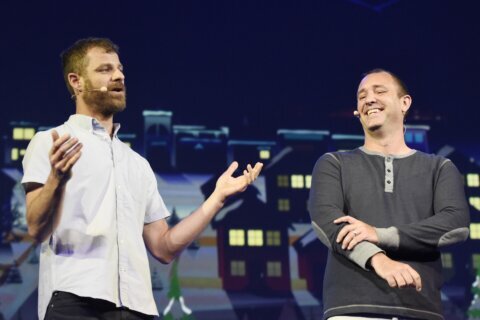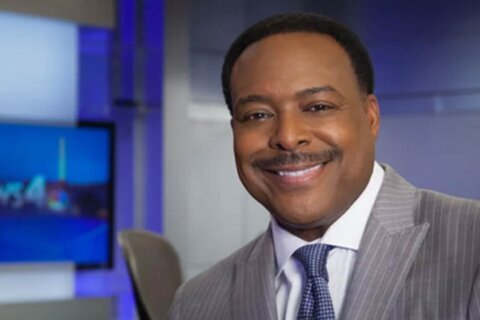For over 70 years, he was at Queen Elizabeth II’s side. Not until he was 96, just three years before his death, did Prince Philip step back from most of his public duties.
Yet, while he did less in the public eye, a spotlight cast by popular Netflix series “The Crown” zeroed in on his life.
For a whole generation of Americans, Prince Philip was a blank slate. “People had some sense that he was this older gentleman next to Elizabeth, but really no specific sense of who he is and who he was,” said Arianne Chernock, an associate professor of history at Boston University.
In recent years, the activities of the younger royals have fueled most of the intrigue, with the second-in-line to the throne, Prince William, marrying Catherine, now the Duchess of Cambridge, in 2011. They have since welcomed three children, with the youngest, Prince Louis, born in April 2018.
Royal fever ran rampant again in the United States in May 2018 when William’s younger brother, Prince Harry, married American former actress Meghan Markle, now known as the Duchess of Sussex. This fascination escalated after the pair stepped back from the family last year, giving up their royal titles before revealing all about their lives in a bombshell interview with Oprah Winfrey broadcast last month.
But arguably also helping to spur interest in the royals among younger Americans is “The Crown.”
The difference, though, is that the show’s first two seasons — released in 2016 and 2017 respectively — revolve around the early years of Queen Elizabeth II’s reign, as portrayed by Claire Foy. That time frame also coincides with the early years of her marriage to Prince Philip, played by Matt Smith.
Smith paid tribute on Friday in a statement that described Prince Philip as “the man.”
“99 and out, but what an innings. And what style. Thank you for your service old chap — it won’t be the same without you,” said the Emmy-nominated actor.
“The Crown” highlights the difficult adjustments the young couple faced as Elizabeth became queen earlier in their marriage than expected. It also shows how, in an era rife with chauvinism and sexism, the need for Philip to fall in line behind his wife was testing.
“The role of prince consort is really challenging and those who’ve taken on that role have had very few precedents to study and very little sense of the concrete job description heading into the position,” said Chernock.
And albeit through modern eyes, many Americans have now formed some view of Prince Philip thanks to “The Crown.”
Mary McClelland, a fan of the show who lives in Chicago, said her opinion of the Queen’s husband was neutral before she watched the Netflix series.
“I think he’s not the best father in the world. I think he did the best with what he could do at the time and in the society he lived in and in the generation he is in,” McClelland told CNN, speaking before Philip’s death. “But I don’t necessarily fault him for who he is.”
While many Americans may not have had a firm impression of Prince Philip, his reputation in Britain evolved over the decades.
“He actually has quite an impish personality. And in Britain, certainly he is known for a number of, kind of, missteps,” Chernock said in a CNN interview also conducted before Philip’s death. “So, his sense of humor and his fun can sometimes get him into trouble.”
“I think the show went a long way to kind of humanize him, to show the man behind the crown,” said Debra Birnbaum, former executive editor at Variety, before Philip’s death. “There is a more layered perspective of who the guy is … for better or for worse.”
Tobias Menzies, who played an older Philip in later seasons of the show, quoted Shakespeare when paying tribute to the late royal.
“If I know anything about the Duke of Edinburgh I’m fairly sure he wouldn’t want an actor who portrayed him on TV giving their opinion on his life, so I’ll leave it to Shakespeare. ‘O good old man! how well in thee appears / The constant service of the antique world…’ RIP,” he said in a tweet Friday.
For some avid fans, each episode of “The Crown” has led to a trip to the internet to learn more about the people involved, including Prince Philip.
“It made me do more research on him and every single aspect of the show,” said McClelland, a communications director for a non-profit. “How intense and crazy his upbringing was, to me, was just fascinating. I mean if he was a modern man, I would be like, ‘get yourself into therapy immediately!'”
But, she added: “You know, the current day royals seem to revere him and love him. And so whatever the dynamic, his grandkids, any time they talk about him and in articles, it’s just that he’s a legend.”
Birnbaum said Peter Morgan, the show’s creator and writer, had worked hard to keep “The Crown” based on reality.
“You’ll never know what two people said to each other in a private conversation, but you’ll know the facts of it,” Birnbaum said. “The conversation may have been imagined, but [Prince Philip] did lose his favorite sister to a plane accident and then became a pilot. That speaks to a very sort of interesting kind of human being.”
Prince Philip also played a big role in modernizing the monarchy — something highlighted in the show. “His commitment to technology, in advocating, for example, filming the family or trying to update systems at Buckingham Palace” was part of that, said Chernock. “And he definitely is a sounding board for Elizabeth and he stayed the course.”
In fact, after all their years together, Elizabeth’s success may very well be owed in some part to the man she married. The man so many Americans knew so little about before “The Crown.”
“Why is Elizabeth successful? She’s successful because she’s really been unwavering,” Chernock said. “I think Philip has a lot to do with that.”







